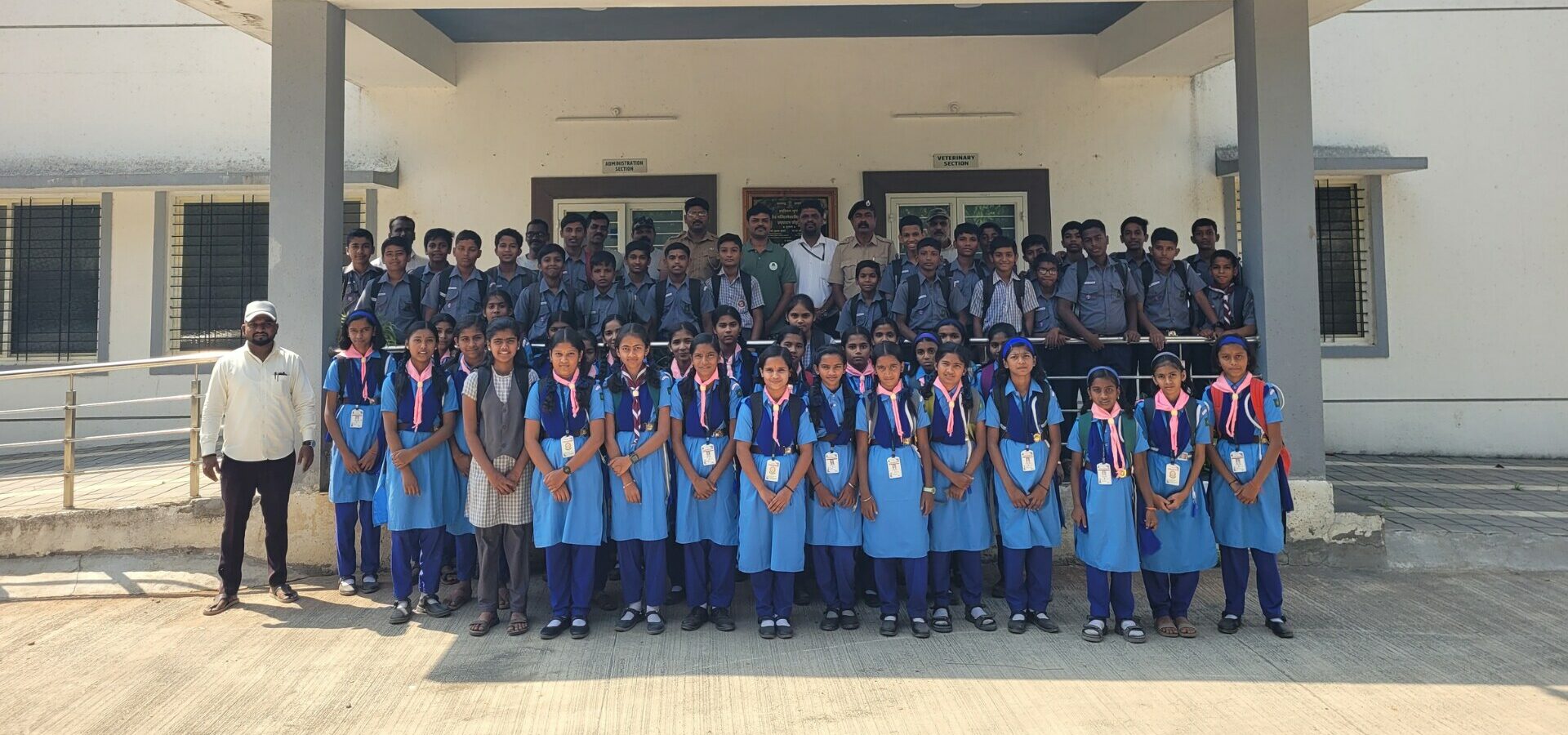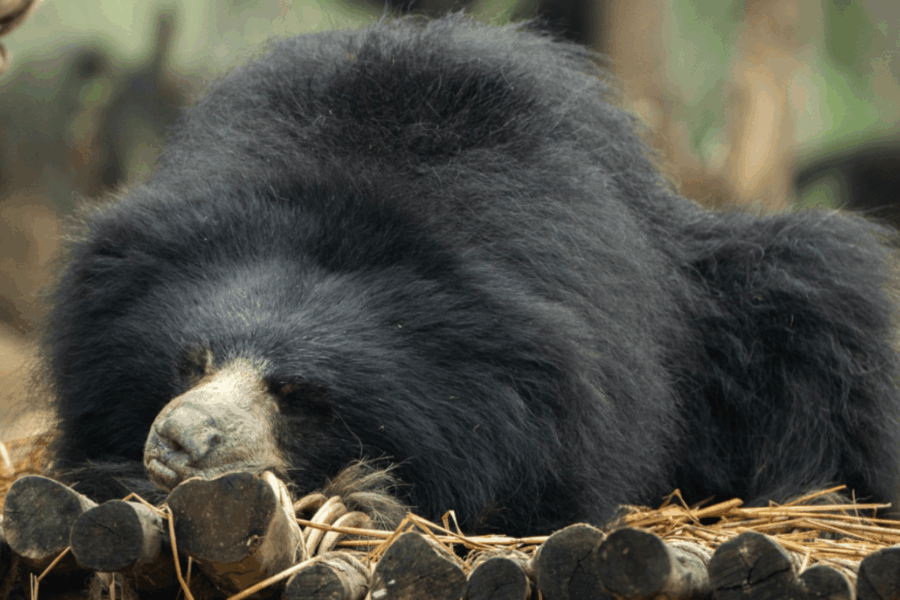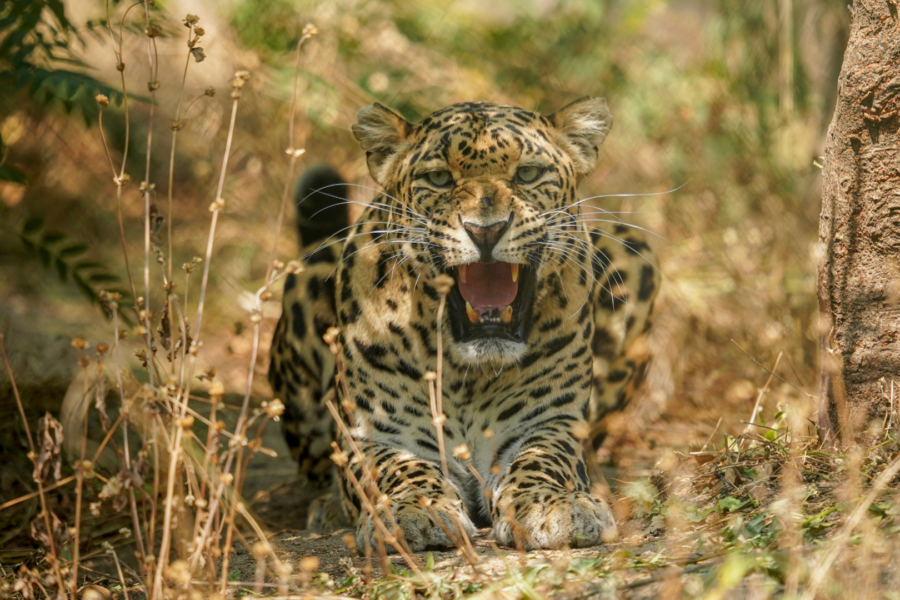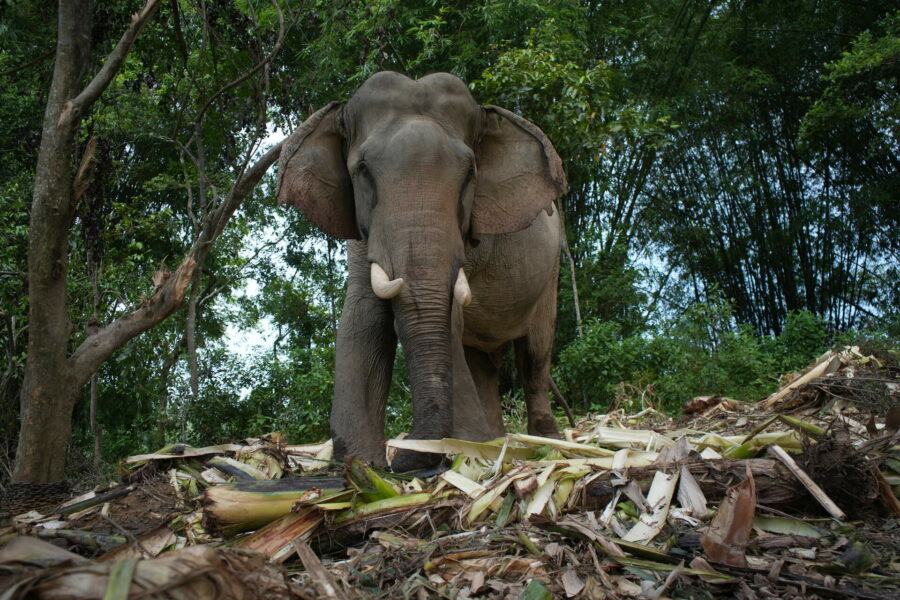Conservation and awareness are perhaps the two sides of the same coin. People learn to protect wildlife when they understand the implications of their loss. Wildlife SOS strengthened its efforts to promote coexistence during February and March 2025 by launching several training programmes and workshops throughout India. These awareness campaigns inspired action, bringing communities, students and policymakers together in the mission to safeguard India’s biodiversity. Let’s take you through the highlights of the sessions held.

- Wildlife SOS conducted awareness programmes in February and March 2025 to foster wildlife conservation and human-animal coexistence. [Photo © Wildlife SOS/ Aditya Mitra]
Advancing Elephant Care in Assam
In India, elephants have long been regarded as representations of power, knowledge and cultural legacy. Wildlife SOS, in partnership with the Assam Forest Department and Assam Animal Husbandry Department, organised the International Elephant Health Care Workshop in Assam on February 24 and 25, 2025, in recognition of the urgent need for both specialised veterinary care and conservation for these pachyderms. Renowned experts including Dr. Susan K. Mikota, DVM, Co-founder & Director of Veterinary Programs and Research at Elephant Care International and Padma Shri Dr. K.K. Sarma, Professor & Head of Department of Veterinary Surgery, Guwahati Veterinary College, Assam, led insightful discussions on disease management, neonatal care, musth-related treatments, and surgical interventions for elephants.

- Dr. Susan Mikota delivered a session on elephant care at the International Elephant Health Care Workshop in Assam. [Photo © Wildlife SOS/Mradul Pathak]
In contrast to workshops that mainly concentrate on theoretical learning, this one was followed by a comprehensive Elephant Health Care Camp from February 24 to March 6, 2025, where participants examined around 80 elephants at three sites including Kaziranga National Park, Manas National Park, and Merapani Forest Reserve while being supervised by well-known national and international veterinary specialists. The camp significantly strengthened conservation efforts and ensured better healthcare for these majestic giants.

- Veterinarians and medical students at the Elephant Health Care Camp in Assam worked together to examine and care for as many as 80 elephants at the national parks. [Photo © Wildlife SOS/Mradul Pathak]
Innovations in Elephant Health Care in Uttar Pradesh
While the workshop and camp in Assam concentrated on improving elephants’ on-site treatment, Agra and Mathura were pioneering alternative elephant care and wildlife conservation education. Veterinarians at the Wildlife SOS Elephant Hospital Campus (EHC) in Mathura to host the 1st electro-acupuncture workshop for elephants in India. Veterinarians of Wildlife SOS received specialised training from international experts in areas such as pain management and nerve stimulation techniques. This workshop held from 14-16 February, 2025 aimed at broadening the scope of veterinary care and treatment in India by opening the gates to alternative therapies.

- Our medical team was guided on acupuncture techniques that can improve the health of rehabilitated elephants like Bani under our care. [Photo © Wildlife SOS/Atharva Anil Pacharne]
Another interesting event for Wildlife SOS that occurred in Agra was the setting up of an awareness stall in association with the Uttar Pradesh Forest Department at the GIC ground on March 25. The main focus was on wildlife protection and visitors were enlightened about different rescue efforts, wildlife conservation and sustainable coexistence techniques. Conversations ignited curiosity and this led to greater comprehension of the adversities India’s biodiversity is facing presently. The stall encouraged common people to get involved actively in protecting the nation’s amazing wildlife.

- Sparking curiosity and action, Wildlife SOS’s awareness stall in Agra educated visitors on conservation, rescue efforts, and the challenges faced by India’s biodiversity. [Photo © Wildlife SOS/Vineet Kumar Singh]
Alongside these advancements, February and March also saw a series of educational visits at the Agra Bear Rescue Facility (ABRF) and Elephant Conservation and Care Centre (ECCC) by probationary officers from various forest training institutes. The centres welcomed 60 forest department officers on probation from Kanpur Forest Training Institute on February 1, 57 officers on February 6 and February 9, and 55 IFS probationary officers from the Uttarakhand Forest Department on February 20 and March 8. On all the occasions, Wildlife SOS’s team provided these groups with a guided tour of both the bear and the elephant facilities, shared their background stories, and briefed them about the organisation’s different conservation efforts. The groups engaged in interactive discussions about the different aspects of animal care. Sessions like these strengthen ethical wildlife rehabilitation factors and convey the importance of scientific yet humane conservation strategies.

- Forest department and IFS probationary officers received in-depth briefings on wildlife rehabilitation, conservation strategies, and ethical animal care during their visits to the Agra Bear Rescue Facility and Elephant Conservation & Care Centre. [Photo © Wildlife SOS/Vineet Kumar Singh]
Wildlife Conservation & Disaster Management in Maharashtra
As Agra introduced new conservation methods, Maharashtra was preparing communities and officials for real-world wildlife challenges. At the Manikdoh Leopard Rescue Centre (MLRC), learning about leopards is more than just an academic exercise—it is a vital lesson in survival and coexistence. The question is simple: If you come face to face with a leopard, what should you do?
For the 60 participants of the Disaster Management Awareness Programmes on February 13 and 21, 2025, the answer was no longer a mystery. Under the guidance of Mr. Mahendra Dhore, Manager at Wildlife SOS – MLRC, attendees got a chance to get hands-on emergency response training. They learned that leopards are not threats to be feared, but are wild animals reacting to their surroundings. Through expert-led sessions, participants discovered how to respond calmly, use proper rescue techniques, and minimise human-wildlife conflict.

- Mr. Mahendra Dhore, Manager at Wildlife SOS – MLRC, guided forest officers through the principles of ethical wildlife rehabilitation, highlighting the importance of humane and scientific conservation strategies. [Photo © Wildlife SOS/Akash Dolas]
Forest officials also delved deeply into this important topic. At Chandrapur Forest Academy, 120 trainees from the forest department and 75 trainee forest officials received intense training in wildlife conservation, rehabilitation, and conflict mitigation on February 20 and March 6, respectively. Mr. Dhore imparted them with knowledge as to how to handle emergency leopard encounters and rescues. He also emphasised the facts to communicate with communities about the different precautionary measures one is supposed to take when staying in a leopard-prone area.

- Trainee forest officials received thorough training on wildlife conservation and conflict mitigation, learning emergency leopard rescue techniques and community safety measures. [Photo © Wildlife SOS/Akash Dolas]
Wildlife awareness begins at a young age and is not limited to officials. School children at Annasaheb Awate Vidyalaya in Junnar on February 28 were enlightened by Mr. Dhore on the value of conservation and the easy, life-saving steps they could take to live in harmony with wildlife. Their interest and participation demonstrated that the best way to lessen fear is through education.

- Students from Annasaheb Awate Vidyalaya visited MLRC, where they learned about wildlife conservation and the importance of peaceful coexistence through awareness sessions. [Photo © Wildlife SOS/Akash Dolas]
On March 22, students from MIT College in Pune took part in an animal conservation discussion. Mr. Dhore presented the realities of interactions between people and wildlife as well as the urgent need for community-driven conservation initiatives. The step towards change is awareness, and thus such conversations can fuel the young minds to generate ideas, which in turn can lead to proper action.

- Students from MIT College, Pune, engaged in a conservation discussion at MLRC, gaining insights into human-wildlife interactions and the need for community-driven conservation efforts. [Photo © Wildlife SOS/Akash Dolas]
Student-Led Conservation & Volunteering in Bangalore
While awareness drives in Maharashtra focused on wildlife conflicts, Bangalore saw some distinguished conservation efforts and actions. Wildlife SOS Education Officer Mr. Pranav Pradeep conducted an awareness session among students of B.Sc Life Sciences at Christ University on February 21, 2025, where he spoke about the different conservation efforts of Wildlife SOS. On March 4, he was invited to a panel discussion titled “Empowering Underserved Communities: Harnessing Partnerships for Well-being and Upliftment” held by the university’s Department of Psychology, where he brought up the significance of government, academic and non-governmental collaborations towards addressing environmental problems. He motivated the upcoming generation of conservationists to explore fieldwork and research activities by sharing his experience with wildlife conservation projects.

- Wildlife SOS Education Officer Mr. Pranav Pradeep conducted an awareness session on conservation efforts for students at Christ University, inspiring future conservationists. [Photo © Wildlife SOS/Pranav Pradeep]
A cleaner forest is a safer home for wildlife and for us. Observing World Forest Day on March 21, Wildlife SOS’s Bannerghatta Bear Rescue Centre (BBRC), Karnataka Forest Department, and JPMorgan Chase initiated a huge cleanup drive in Ragihalli State Forest, Bannerghatta National Park. Close to 300 volunteers joined the force to clear a 5-km road, picking up one tonne of garbage to safeguard the delicate ecosystem. Forests are the lungs of the Earth, and keeping them free from pollution guarantees a healthier tomorrow for future generations. Wildlife SOS continues to be dedicated to conserving green belts and the wildlife that inhabit them.

- On World Forest Day, collective action turned awareness into impact, breathing new life into Ragihalli’s green expanse in Bangalore. [Photo © Wildlife SOS/Meghalok Giri]
This year, at India’s largest volunteering conference ‘VolCon’, Wildlife SOS CEO & Co-founder Mr. Kartick Satyanarayan delivered a powerful keynote on volunteerism’s transformative force in conservation. The conference was held on March 6 and gathered NGOs, business leaders, and social changemakers to discuss how volunteering can fuel effective environmental change. The conference reaffirmed that each one of us needs to contribute towards a sustainable future for wildlife.

- Joining a panel of changemakers and young visionaries, Wildlife SOS Co-founder Mr. Kartick Satyanarayan explored innovative models of volunteering — the ones where passion meets purpose. [Photo © Wildlife SOS/Meghalok Giri]
Empowering Women & Tribal Communities in Hyderabad & Delhi
While events in Bangalore prioritised more towards what action can be taken for the betterment of the planet, events in Hyderabad and Delhi focused more on empowering communities through conservation-based empowerment initiatives.
International Women’s Day on March 8 was celebrated at Forsys Software Pvt. Ltd., Hyderabad, with a special awareness and educational session on the Tribal Rehabilitation Programme and empowerment initiative of Kalandar women by Wildlife SOS. On this occasion, Wildlife SOS Merchandise Manager Ms. Kamini Chandar shared the struggles and hardships that these tribal communities face and how Wildlife SOS is helping them learn new skills, provide education and prevent child marriages. The session was followed by a display of the Kalandar community’s handmade merchandise. This event highlighted that by supporting a community that earlier relied on ‘dancing’ bears for their livelihood, Wildlife SOS has spearheaded a holistic approach towards the conservation of sloth bears.

- At Forsys Software Pvt. Ltd., Wildlife SOS celebrated the strength of women by citing the successful stories of empowered Kalandar women. [Photo © Wildlife SOS]
In Delhi, Wildlife SOS organised a merchandise stall at DLF Mall of India from March 7-9, 2025. Wildlife SOS members engaged with visitors, narrating the tales of rescued and rehabilitated animals that were found in distress. The stall was both a campaign to raise funds and an educational initiative, bridging the gap between the conservation efforts and people.

- Wildlife SOS put up a stall at DLF Mall of India, Delhi, where along with the Wildlife SOS merchandise, awareness about threats to wild animals was shared. [Photo © Wildlife SOS]
Earlier this March, Wildlife SOS was invited to Pathways World School for a Class 5 and 6 project on elephants and conservation. Over 100 curious students attended the session, where Mr. Rishabh Mehta and Ms. Sneha Parul from our Communications team gave a talk on our work. The students’ knowledge and questions took us by surprise—a wonderful reminder of why awareness matters.

Spreading Awareness in Jammu & Kashmir (J&K)
In the Dachigam and Pahalgam rescue centres, Wildlife SOS conducted interactive educational sessions involving locals, and even national and international tourists, in dynamic conversations about human-wildlife conflict and harmonious coexistence. Ms. Aaliya Mir, Wildlife SOS Education Officer and Manager in J&K, focused on community outreach during the winter break when schools were closed to ensure that awareness did not wane. She equipped communities with the knowledge on how to handle recurring wildlife encounters safely. Through interactive discussions and real-world inputs, she emphasised on conscientious living and responsible waste management. Each session aimed to inspire action and highlight the unique relationship that exists between people and wildlife.

- In leopard-prone areas of Kashmir, Ms. Aaliya Mir is bridging the gap between fear and understanding, equipping communities with knowledge to respond safely, calmly, and with compassion. [Photo © Wildlife SOS]
Wildlife SOS continues to be at the forefront of conservation through education, awareness and direct intervention. Whether it is through workshops by experts, engaging with communities, or pioneering veterinary intervention, every effort is an attempt towards a future where humans and wildlife peacefully coexist. If you would like to connect with Wildlife SOS to hold awareness sessions at your school, university or workplace, kindly email us at education@wildlifesos.org.
Feature image: Wildlife SOS/ Akash Dolas





















